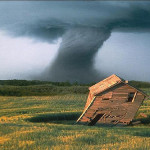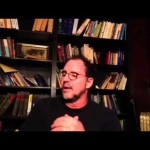We run our website the way we wished the whole internet worked: we provide high quality original content with no ads. We are funded solely by your direct support. Please consider supporting this project.

The Earth is a Spiritual Battlefield
The early Church Fathers uniformly believed that angels, like humans, were created free and given a sphere of influence and responsibility over creation. As with humans, angels could use this influence for good, as God intended, or they could choose to use it for evil. They understood that this is simply what it means for God to have given us free will. The earliest fathers thus believed that, just as God had given humans “say-so” over the earth, which we could use for better or for worse, so God gave “say-so” over aspects of the cosmos, and to some degree over humans, to angels.
For example, Athenagorus argued that “the Maker and Framer of the world distributed and appointed … a multitude of angels and ministers … to occupy themselves about the elements, and the heavens, and the world, and the things in it, and the godly ordering of them all.” Then he adds,
“Just as with men, who have freedom of choice as to both virtue and vice … so is it among the angels. Some, free agents, you will observe, such as they were created by God, continued in those things for which God had made and over which He had ordained them; but some outraged both the constitution of their nature and the government entrusted to them” (A Plea For the Christians, 10).
So too, Origen held that every aspect of nature was under the care of “invisible husbandmen and guardians” (Against Celsus, 8.31). St. Gregory at a later date reiterates the prevailing view of the early church when he says, “In this visible world … nothing can be achieved except through invisible forces” (Dialogues, IV.5).
“Natural” evil was consistently explained in the early church as resulting from these spirits rebelling against God and thus abusing their authority over creation. Hence, for example, Origen argued that famines, scorching winds and pestilence were not “natural” in God’s creation; they were rather the result of fallen angels bringing misery whenever and however they were able (Against Celsus, 8.31). These rebel guardians were also “the cause of plagues…barrenness…tempests… [and] similar calamities” (Against Celsus, 1.31).
So too, Tertullian argued that “[d]iseases and other grievous calamities” were the result of demons whose “great business is the ruin of mankind.” When “poison in the breeze blights the apples and the grain while in the flower, or kills them in the bud, or destroys them when they have reached maturity …” one can discern the work of these rebellious guardian spirits (Apology 22). For Tertullian, as for Origen and Athenagorus (and we could add Tatian, Justin Martyr, Clement of Alexandria and others), creation doesn’t consistently reflect the beauty of its Creator because it has been, and is being, corrupted by demonic forces.
Following the teachings of the New Testament, these early theologians all understood that the leader of the rebel army that ravaged nature was Satan. In the words of Athenagorus, Satan was “the spirit” originally entrusted with “the control of matter and the forms of matter” (A Plea, 24). The entire material creation was to be administrated by this highest-ranking angel, according to this theologian.
Unfortunately, this “spirit” used its free will to rebel against God. He now exercises his tremendous authority over material creation against God. He abuses “the government entrusted to [him].” Given the nature of moral responsibility, God could not simply revoke Satan’s sphere of influence. Hence, Athenagorus argued, “the prince of matter exercises a control and management contrary to the good that is in God” (A Plea, 25).
Reflecting the basic vision of the early Church, Athenagorus concluded that everything in nature that obviously looks contrary to God’s character appears that way because it is contrary to God. It didn’t arise from the omni-benevolent hand of the Creator (as the atheists of his day and ours object) but was rather due to the activity of an evil “ruling prince” and “the demons his followers” (A Plea, 25).
Much more could be said about this, but I hope this suffices to show that the early church fathers all saw creation as a war torn battlefield. It had been corrupted to its very core. And this is why nature is violent, both toward animals and people. I don’t believe this view would have arisen in the church were the foundation for it not laid in the apostolic tradition. These early fathers are simply working out the implications of the biblical view that Satan is the “lord of the earth,” the “ruler of the air” and the “god of this age” who “controls the entire world.”
And if you ask me, they were on the right track.
So when a hurricane wipes out an entire village or an earthquake massacres thousands of people; next time you consider the millions dying from AIDS or the millions tortured by parasites; next time you hear about the millions suffering from drought and famine, or consider the untold pain of millions suffering and dying from any number of other diseases, don’t say “This is the work of God.”
Say rather, “An Enemy has done this” (Mt 13:28).
Image by Zoriah via Flickr.
Category: General
Tags: Church Fathers, Evil, Free Will, Satan, Spiritual Warfare
Topics: Spiritual Warfare, Cosmic Conflict
Related Reading

The Risk of Love
The most basic and yet most profound teaching of the Bible is that “God is love” (1 Jn 4:8; 16). He is revealed to be a God who is triune—Father, Son and Holy Spirit (See Mt 3:16; 28:19, Jn 14:26; 15:26)—who’s very essence is an eternal, loving relationship. He created the world out of love…

What does the Bible mean when it says God “sent an evil spirit” on certain people?
Question: In Judges 9:23, I Samuel 16:15ff and 18:10 it is said that God sends evil spirits on people. Doesn’t this support the idea that everything Satan and demons do is under God’s sovereign control? Answer: I’ll make six points in response to this question. 1) If everything Satan and demons do is under “God’s…

“Natural” Evil? 7 Arguments Implicating Satan
Image by Jmos® via Flickr We believe that God is the Creator of nature, but nature simply does not seem to point to a God of love. Parasites, viruses, bacteria, diseases and cancer kill millions and torment millions more, humans and animals alike. Earthquakes, hurricanes, tsunamis, mudslides and volcanoes do the same. Theists have traditionally argued that…

Typhoon Haiyan and “Natural” Evil
Greg recorded his thoughts a few days ago on Typhoon Haiyan and the reality of “natural” evil that’s not really natural at all. “This an enemy has done.” (Matthew 13:28)

The Warfare We Have Inherited
Image by Chris Sardegna Jesus’ miracles over nature, as well as his healings, exorcisms and especially his resurrection, were definite acts of war that accomplished and demonstrated his victory over Satan. These acts routed demonic forces and thereby established the kingdom of God in people’s lives and in nature. But their primary significance was eschatological. People…

Podcast: Are We REALLY Free if God is Going to Ultimately Trump Our Choices?
Greg looks at the nature of freewill, specifically: how God’s promises constricts human free will. http://traffic.libsyn.com/askgregboyd/Episode_0070.mp3
